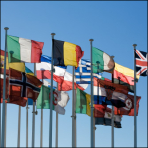Registration
You will receive an email confirming your registration.
IMGXYZ1439IMGZYXWith the inauguration of President Obama, the divide that had opened up in recent years between Europe and the United States over democracy promotion policies and programs appears to be lessening. As both the new U.S. administration and Europe move forward, a new convergence of U.S. and European approaches on democracy may be emerging.
In an event co-sponsored by the Carnegie Endowment, the Embassy of Sweden, and International IDEA, panelists discussed the potential for greater cooperation and convergence between Europe and the United States on democracy promotion. Jonas Hafström, Swedish ambassador to the United States, gave the opening remarks. Maria Leissner, Swedish ambassador for democracy, Vidar Helgesen, secretary general of International IDEA, Ingrid Wetterqvist, director at International IDEA, Pia Bungarten, Friedrich Ebert Stiftung representative to the U.S. and Canada, and Larry Garber, expert-consultant, USAID, participated in the discussion. Carnegie’s Thomas Carothers moderated.
Improving European Union Democracy Support
A new report, commissioned by the Swedish Government and carried out by International IDEA, suggests that although recipients of European Union democracy assistance generally perceive the EU to be a credible and reliable partner, a significant percentage view EU policies as hypocritical, incoherent, and aloof. Wetterqvist noted that the report confirms the existence of a disconnect between the perceptions of EU democracy support and the intentions behind that support. She suggested that the EU draw the following lessons from the report:
- Allow the internal democratic expansion of the EU to inform its external democracy assistance programs.
- Move toward a broader definition of democracy.
- Demonstrate a willingness to establish long-term commitments.
- Develop genuine partnerships with recipient countries.
Integrating Democracy and Development
Leissner explained that democracy and human rights must become an integral part of development work. This integration will require a new understanding of democracy support, one that respects different forms of democracy while also recognizing that democracy is a universal value.
Both Garber and Carothers cautioned that an overly close integration of development and democracy promotion raises important issues on how to proceed in countries where the EU and the United States do not engage in development assistance, but do have an interest in supporting democracy, such as in Russia or Saudi Arabia. Garber argued that a single model for democracy and development may be untenable. He suggested a case-by-case approach.
Differences in EU and U.S. Democracy Assistance
Even with the change in U.S. administrations, some significant differences in European and U.S. democracy assistance approaches are likely to remain:
- Leissner remarked that the United States is more willing to require political reform in exchange for aid than Europeans.
- Americans have tended to keep democracy support separate from larger development strategies, Bungarten noted, in contrast to German political party foundations, which have sough to integrate democracy support and development strategies.
- German democracy assistance efforts are generally less confrontational and more focused on dialogue and consensus with targeted governments, Bungarten added. The United States, in contrast, more often applies diplomatic pressure and supports opposition movements.
- Bungarten clarified that in the field, significant differences between U.S. and European democracy support are minimal.
- Garber agreed that the United States, particularly USAID, has traditionally been slower to integrate democracy and development than the Europeans.
- Garber also noted that the EU is less likely than the U.S. to speak assertively concerning democracy's value. Additionally, Garber suggested that the U.S. will probably remain more willing to use pointed approaches, such as funding anti-government organizations in countries resistant to democratic reform.
Signs of Convergence
Despite such persistent differences, the Obama administration has signaled that there are spaces for possible convergence on U.S. and European democracy assistance approaches. Garber pointed out that presidential speeches are often the clearest indication of U.S. policy. He suggested that President Obama's Cairo and Moscow speeches indicate a new U.S. preference for multilateral approaches to democracy assistance, a clear shift towards the European position.
Helgesen and Leissner agreed. Helgesen said that International IDEA has perceived a growing convergence with U.S. ideas on democracy assistance. Similarly, Leissner noted that President Obama would likely agree with the conclusions of the recent publication of European Council on democracy support.
Dissenting slightly, Bungarten argued that it remains unclear whether President Obama will decisively shift U.S. democracy support policy closer to the European position.
Forging Greater EU-US Cooperation in Democracy Assistance
All panelists agreed that conditions are right for greater U.S-EU cooperation on democracy assistance cooperation, but that it will take concerted effort to bolster communication and coordination. This is especially the case in the face of growing ideological and material challenges from nondemocratic nations, such as Russia and China. Bungarten called for the creation of new fora to facilitate communication and coordination. Leissner suggested the establishment of an early-warning system to help identify nations that are at risk or beginning to experience democratic setbacks.
